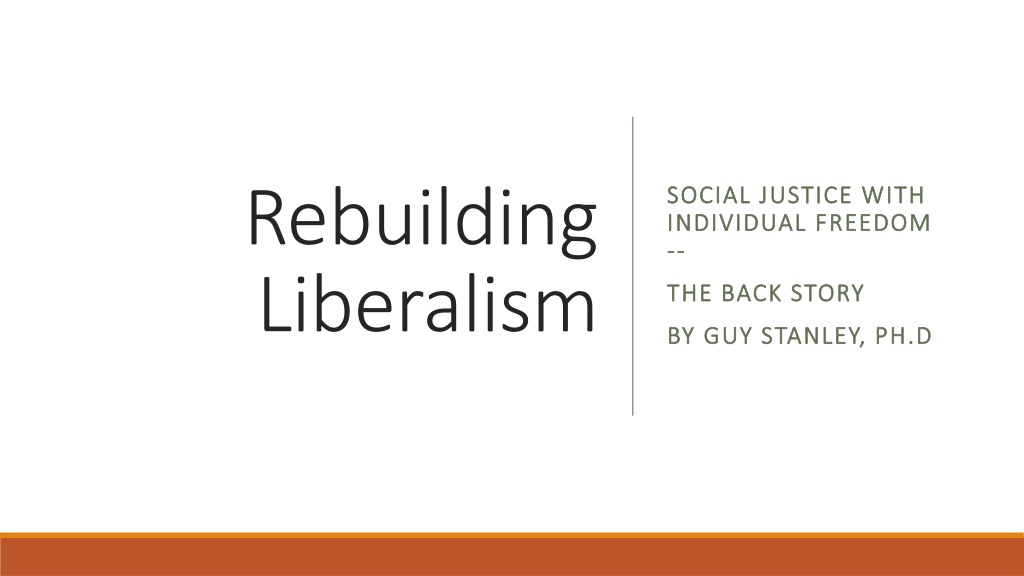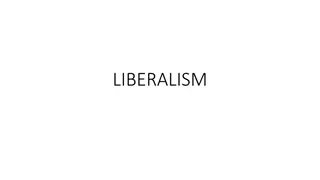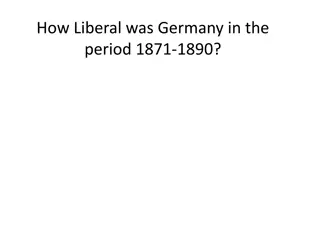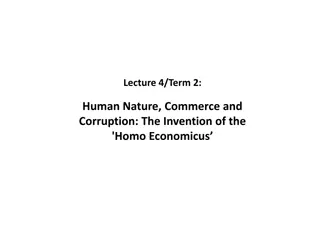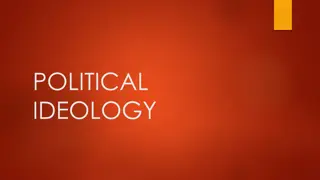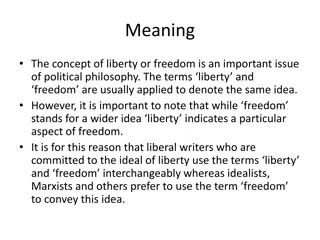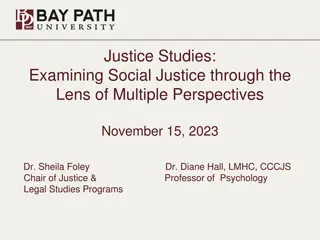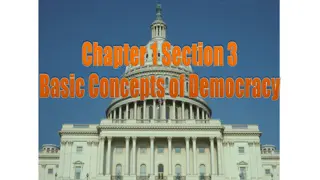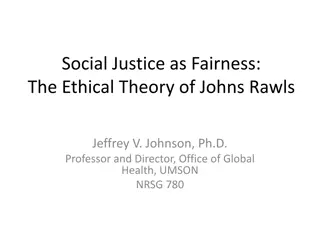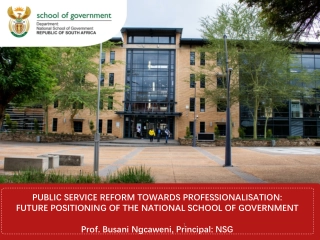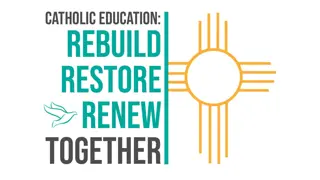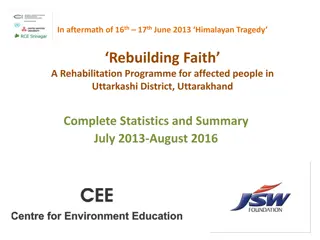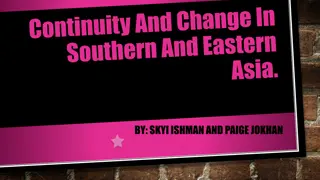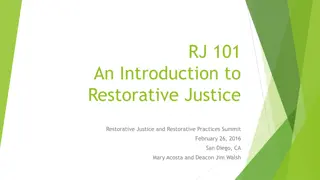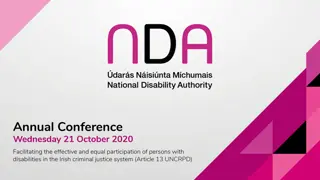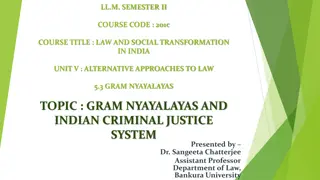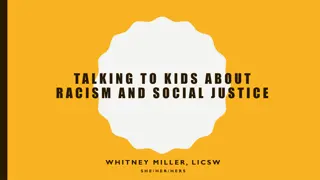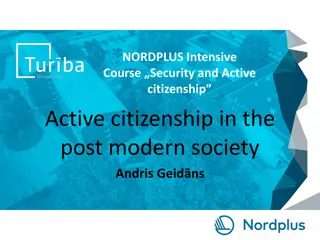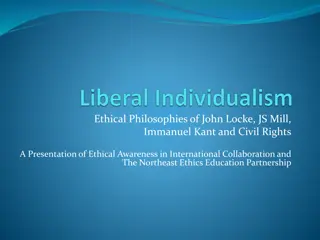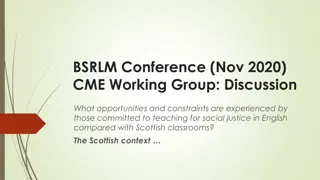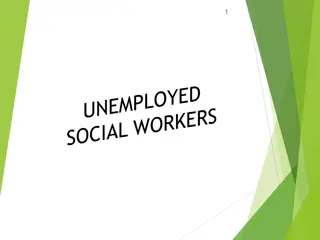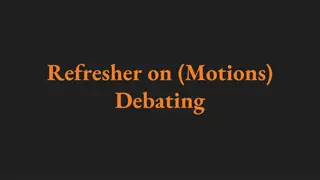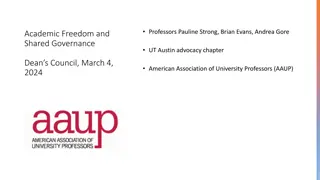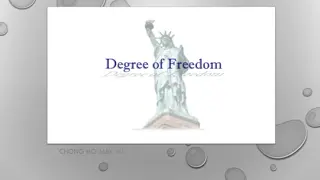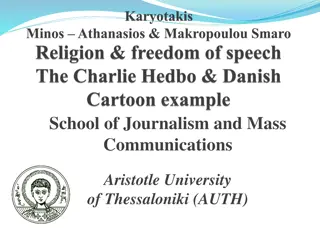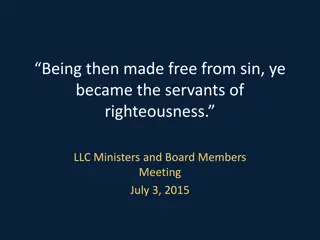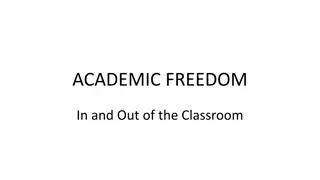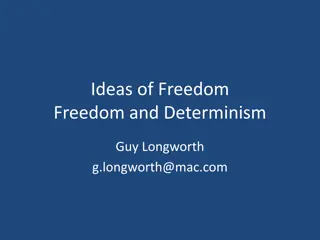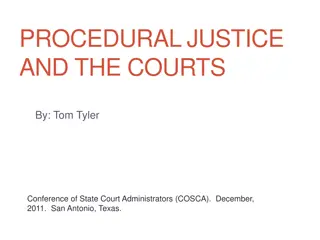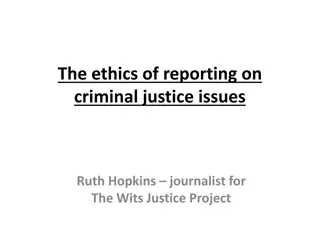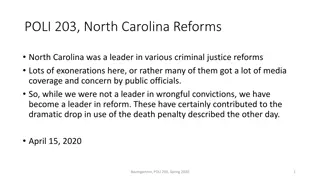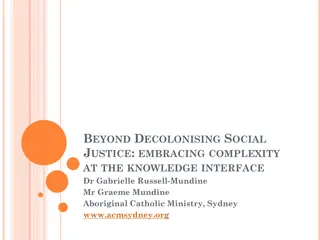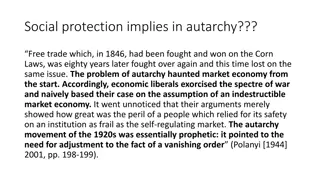Rebuilding Liberalism: Social Justice with Individual Freedom
The book "Rebuilding Liberalism" by Guy Stanley, Ph.D., challenges neo-liberalism's laissez-faire approach and emphasizes the importance of civil society in achieving social justice and individual freedom. It outlines how the state influences markets, money, and law, and highlights the need for democratic processes and collective commitment for a functioning liberal society. The author argues for a policy focus on civil society over the economy, advocating for a balanced relationship between politics, economics, and social values.
Download Presentation

Please find below an Image/Link to download the presentation.
The content on the website is provided AS IS for your information and personal use only. It may not be sold, licensed, or shared on other websites without obtaining consent from the author. Download presentation by click this link. If you encounter any issues during the download, it is possible that the publisher has removed the file from their server.
E N D
Presentation Transcript
Rebuilding Liberalism SOCIAL JUSTICE SOCIAL JUSTICE WITH INDIVIDUAL INDIVIDUAL FREEDOM -- -- WITH FREEDOM THE BACK STORY THE BACK STORY BY GUY STANLEY, PH.D BY GUY STANLEY, PH.D
The Order of Business The Back Story: Socio/political adjustment to a technologically driven transformation Summary of the Book and its Conclusions about putting Civil Society first. Theories of industrial transformation How Did They Do it? Can We Do It Too? 2 PRESENTATION TO CFSN BY GUY STANLEY, PH.D. 22-11-19
The Book is a quiet polemic a refutation of Neo-Liberalisms claims for laissez faire, austerity and micro-economics as the basis of a free economic and political order, based on universal principles. The book demonstrates three inconvenient truths for the neos:- Rebuilding Liberalism (1) The state matters markets, money, and law are the creations of the state, (2) freedom is the consequence of a democratic process, controlled markets, and (3) a collective commitment to advancing the quality of civil society. Its conclusion is that Liberalism can work iff (if and only if) the condition of civil society is the main policy concern. This reverses the priorities of those for whom the state is at the service of the economy. 3 PRESENTATION TO CFSN BY GUY STANLEY, PH.D. 22-11-19
Boulding Triangle rearranged To This From This Civil Society Policy Market 4 PRESENTATION TO CFSN BY GUY STANLEY, PH.D. 6-12-19
Civil Society On Top means this:- Politics is the process by which meanings are determined and priorities assigned to the conversations about individual and collective action. The challenge is that of understanding and dealing with the process in such a way that not only individual but also general outcomes can be improved according to the relative weights assigned by the process. A Nod to Saussure: - meanings of words are determined in relation to other words. You have to know the whole language to master its parts. Learning, speaking and reading a language are thus whole brain activities, involving both the analytic and synthetic hemispheres. Ultimately, control is achieved by constructing institutions to stabilize the flows and allocate the costs and benefits of interactions at the material and also symbolic levels. This is an on-going conversation between government and civil society, with markets, courts, controls systems and agencies, and so on, all the time. The goal is a society that enjoys a coherent relationship balance - between its parts and the whole and that reflects its social values including democracy and rule of law. The book shows that economics is a necessary tool but misleading in the absence of the social sciences such as history and sociology to provide context and perspective. 5 PRESENTATION TO CFSN BY GUY STANLEY, PH.D. 22-11-19
The Back Story The Back Story in the book amounts to a different take on an old problem: -How societies adapt to massive technological transformation specifically the industrialization process of the North Atlantic economies between 1815-1950. In contrast to the main bodies of work on this issue, my concern was neither an anatomy nor Revolution, nor the comparison of theories, say Tocqueville and Marx, or Comte and Darwin/Spencer, etc. Instead, the argument in the book offers a historical demonstration: What they then did to get better results, and so on. What people thought, What they did, What results they obtained, The benefit of this approach is to minimize the use of pre-cooked historical schemata (mainly on revolution ) in favour of listening to the voices. I tried to follow and analyze the national conversation in England, France, Germany and the US at different times over this period to find out how the speakers (writers) experienced industrialization and its consequences. 6 PRESENTATION TO CFSN BY GUY STANLEY, PH.D. 22-11-19
What my research shows: - besides the advances industrialization brings about: Laissez-faire capitalism routinely forces some 30 per cent of civil society to need supplementary assistance to survive Only the State can provide that assistance at the scale and standard required to restore social status and function to the recipients. Social assistance has to be provided in a form that enhances individual dignity. Research Results Just as some laws enhance market efficiency and promote competition, other laws enhance civil society, including labour and consumer protections, and assure supply of adequate social services education, health care, social insurance, poor relief, with labour laws that include adequate insurance protection and the right to organize and share control of the firm, via structured collective negotiation. Working this out amounted to an immensely difficult process of social learning that took roughly 200 years (1750-1950) in Western Europe and North America, progressing unevenly, including wars and devastation. (About the same as adjusting to books printed in the vernacular 1472-1648, via the 30 Years War (1618-1648)). 7 PRESENTATION TO CFSN BY GUY STANLEY, PH.D. 22-11-19
Liberalism and the Long Revolution In brief: It s definitely NOT the economy; rather it is entire cultures and anthropology that change under the impact of (1) a shift in the balance between individuals and the collective (books/tech); (2) the impact of industrialization (3) the absorption of capitalism and globalization. (Warning: the digital rev. is just getting underway !) To understand the challenge, one must understand the scale of the effort it took the whole North Atlantic Economy two centuries to complete the transition to a social democratic welfare state. More than economics, Liberalism is also more than just political philosophy: its history summarizes Western political development to Social Democracy the winding track of the development of Western civilization, especially aspects supported by language and literature i.e. the development of the individual personality as a moral agent and of collective action: especially the fit between the individual and the collective. The outcomes were never certain. A great deal of the struggle has been washed away by the forces of modernism- the liquification of the fixed reference points of the past, and the rising tide of the new, digital reality. Much of this is forgotten! However, just as Galileo left his trial muttering that the world still turned, we can still insist not just that ideas matter, but it IS the ideas that matter. 8 PRESENTATION TO CFSN BY GUY STANLEY, PH.D. 22-11-19
The Social Learning Process involved these (among other) steps between 1815 and 1914:- Political Claims of James Mill and middle class rule, based on ultilitarianism and the opposition, by both Marx AND Burke. Moving from Dynasty to Nation, from genealogy to election. Warnings about industrialisation (Saint-Simon, Comte and Durkheim) Coming to terms with a multi-generational social disaster: the transformation of class relations from late feudal to mid-stage industrial capitalism (1750-1850/80). Rise and critique of Bourgeois culture (Hegel (1806) to Nietzsche (1872), or Austen to Dickens to Eliot (Social novels-mid 19c), or Hawthorne to Whitman to Steinbeck), Herder to Mann (Bildungsroman), Balzac/Sands-Hugo to Mallarm (les po ts maudits) /Zola- ..(today) Houllebecq : How should we imagine life in such a society? Music- Beethoven to Gershwin Argument in the Book (slightly extended) Economic Dialectic (assertion & refutation): Smith/Ricardo-Malthus, Proudhon/Marx,German socio-historians (List-Roscher-Schmoller), Marshall- .to the 1950- 80s Keynes, Hayek-Friedman, Eucken, Ricoeur, Habermas. The focus of rationality . Socio-Dialectic: Comte-Mill-Durkheim- List Marx-Dilthey- Simmel-Weber- ..(1920-40s) Elias-Parsons How does society work. What happens to religion and other transcendant ideas? Philo Dialectic: Kant-Hegel-Nietzsche- (Sorel) Husseri-Heidegger- ..(1940s+) Sartre/Camus- Levis-Strauss- Rawls-Derrida and the post-moderns , problem of technology NOTE THE IMPORTANCE OF DIALECTIC ALTERNATIVE (COMPLEMENT?) TO WAR - (Five Wars One in the US, Four in Europe (1850s to 1870s) Three armed suppressions in Canada (1837,1875,1885) Confrontation was necessary. Did not always work. (Also Boer War and two Balkan Wars in the early 20th c.) 9 PRESENTATION TO CFSN BY GUY STANLEY, PH.D. 22-11-19
Some Examples: West German postwar Ordoliberalism (Walter Eucken):- A synthesis of historical German and analytical Austrian economics, plus Catholic social theory. Based on competition as a source of productivity improvement which forms the basis for growing social services as well as national prosperity. The emphasis is on improving quality over quantity and on saving rather than spending, with explicit support for deepening the capacity of small business to compete in high value niches both on their own and as suppliers to national champions that are global leaders in their field. Regulatory emphasis on quality of life and artistic as well as material achievement. The New U.S. Industrial State (Keynes and J.K. Galbraith): Intimate alliance of national state with the major industrial corporations which become generators of the demand that they are best suited to fulfil. Emphasis on sustained aggregate demand controlled by Keynesian fiscal measures, limited social services. Prolonged the New Deal into the 1960s, after which it broke down from sustained guns AND butter policies together with sectional/racial division. Its flamboyant consumerism nevertheless weighed heavily on the USSR and ultimately led to its Cold War defeat. Challenged by the communitarian liberalism of John Rawls, a bridge too far for LBJ. British Welfare State (T.H. Marshall) Takes citizenship as the basis of entitlement to generally available social services, from National Health Service to University Education, to zero(low) unemployment. Huge advance in context of British class warfare (post war kitchen sink theatre) and a success until the end of the 1960s (Swinging London). 10 PRESENTATION TO CFSN BY GUY STANLEY, PH.D. 22-11-19
Examples, Contd: Post War France (Le Grandeur d tat, Ve R publique): Alliance of Gaullists and Communists preserved stability for recovery, the nationalization of basic industry and full employment as recovery continued despite the burden of continuing colonial wars, especially Algeria, whose loss was disruptive to the French economy. French industry recovered, in part owing to the synchronisation arising from the indicative planning of le Minist re du Plan. By the end of the 1960s, France had joined its North Atlantic partners as a technocratic consumer society, the emergence of news magazine, le drugstore and le marketing (Le D fi am ricain) signalling the influence of the US. Upshot a burst of post-modern (J-F Lyotard) subjectivity emerged to explode the conventions and one size fits all categories underpinning postwar Western thought. Yet ultimately Les v nements proved a defeat for the Left. What was a blow for individualism was also a fatal attack on the Republican Spirit (l esprit r publicain) that up to then still motivated some sacrifice for the common good. Thereafter, France became less interested in collective solutions, moving steadily rightward to where its stands today, a remorseful buyer of post- modernism. French intellectuals who were not happy to see the return of capitalism even the techno-consumer kind developed a critique of it similar to that of Germany s Frankfurt School. In 1968, as a kind of prelude to the Prague Spring of that year, Paris erupted in May with student and worker riots against its one dimensionality - a massive anti- authoritarian critique against French administrative structures, akin to the Berkeley Free Speech Movement, but with a larger dose of the Old Left as well as the New. 11 PRESENTATION TO CFSN BY GUY STANLEY, PH.D. 22-11-19
Canada Whereas the aforementioned states concentrated on building or re-building productive capacity, Canada focused on securing rents from its natural resources, opening the uranium mines of Northern Ontario alongside the immense iron and nickel deposits that sustained allied war production, pushing further into advanced technologies of radar, electronics and jet aviation, and creating a welfare state that was ultimately guided by John Rawls principles of a Keynesian macro-economics designed to guarantee a structural advantaged to low income citizens. The OPEC inspired oil crisis of 1973 provoked the national government to double down on a rents-based strategy and increase its control of hydrocarbon energy industry with a national energy program in 1980. The strategy of locking in rents continued until resources prices collapsed in the mid-1980s, opening the door to a reversal of Keynesianism, partial rejection of the welfare state, and the shift of strategy towards so called framework solutions designed to minimize government intervention in favour of expanded scope for market-based solutions. The most important example of the new approach was the Canada-US Trade agreement concluded in 1986. Examples, Cont d. The change in economic strategy involved a process of national conversion that began with a royal commission and continued through to the signing and implementation of the deal. The conversion did not end the dependence on resource rents. An accompanying re- conversion to a consensus of progressivism has yet to occur to match the political vote. Perhaps a new RC is indicated for a new strategy to address climate change, the Rise of Asia and the USG reluctance to pursue its self-appointed role as global policeman . The new strategy would have to focus on re-building national capabilities in new technology sectors so that Canada can join the club of successful high income innovator nations, capable of helping the world overcome its new challenges. 12 PRESENTATION TO CFSN BY GUY STANLEY, PH.D. 22-11-19
Two Theories on Tech and then one more Saint Simon/Comte/Durkheim & Marx Tech bifurcates society: puts status at service of function. Transition from dynasty to nation. Property only counts in relation to its productivity: Lower p. idled, massive dislocation - alienation Challenge: integration of the displaced by education/employment, offered by the State. Financial Dimension creates a new class the capitalist. Radically transforms social relations into a cash nexus . Workers no longer own their work and are disposable resources in capital s drive to reproduce itself through the transformation of labour into cash value. (Marx) Heidegger on Technology Implacable force, crushing Nature via ego- driven Design (The Will to Power) Totalizing in forcing submission to its operating rules Total Cost of ownership is higher than Total Benefit for Humanity 13 PRESENTATION TO CFSN BY GUY STANLEY, PH.D. 22-11-19
Technology an extension of some human faculty Communications media an extension of sensory perception the medium as the message (or massage). The dominant media shapes the organization of society/civilization via its impact on sensory perception. Eric Havelock/Harold Innis/Marshall McLuhan (Toronto or Canadian Communications School) The Key Tension is between acoustic (oral/auditory communication)and visual-writing, diagrams, logic, abstractions - i.e. acoustic as concrete, mosaic of natural sounds, voice, rhythm, musical synthesis (massage) and visual-analytical favoring abstract, linear analysis (message) concept of empty Euclidian space, waiting to be filled with point, line and angle, as in a geometrical demo. McLuhan believed that TV and Internet would resolve the tension, making possible a synthesis of the concrete, specific oral-auditory sensors and the abstract-linear-analytical: a new mosaic . 14 PRESENTATION TO CFSN BY GUY STANLEY, PH.D. 22-11-19
McLuhans Tetrad of Technology Impact Every new technology will impact society in the same way enhancing some faculties, reversing others, retrieving some previously suppressed functions and obsolescing others. The following diagram illustrates his point: Enhance Reverse Retrieve Retire (Obsolesce) 15 PRESENTATION TO CFSN BY GUY STANLEY, PH.D. 22-11-19
Enhanced abstract, analytic reasoning, popular education, printed books, mass media, public political debates. Print media created a national elite and enabled it to win acceptance for the values necessary to build modern industrial society bridging a chasm of unfolding social disaster caused by dislocations to forge nations based on common language(s) and culture. McLuhan Lets Us See How Media Changed the Culture in Uneasy Support of the Industrial Project Encouraged - but not always delivered- general acceptance of human beings as moral agents, entitled to dignity and some respect. Reversed Universities GAINED in Importance (after taking a beating following the religious wars) as Polytechniques AND as sources of ethical development, historical research and critique: lively exploration of meaning and social analysis, especially France and Germany. Retrieved Concepts of the collective and emotional experience (Romantic movement) to balance Enlightenment (Bentham) focus on rational individual pleasure v pain and utilitarian behaviourism (to counter feudal privilege). Obsolesced: - Aristo Status with no function, the family as the central economic unit, rigid separation of classes, fixed social status based on genealogy. It took pioneers of modern social science and pillars of modern lit and philo to enable the emergence of nations , with reasoned debate, adjustment along a social contract line(Edgeworth)- and even so France lost its democracy for 20 years and Germany s democracy was flawed in a way the proved fatal in 1914 and led directly to the Soviet revolution in 1917 and so on. 16 PRESENTATION TO CFSN BY GUY STANLEY, PH.D. 22-11-19
Our Challenge: A Non Linear World - Need N-L Social Science (Economics, too) Source: Table 1.1 in OECD (2012) Complex New World: Translating New Economic Thinking Into Public Policy, Ch. 11 Beinhocker, p.136 17 PRESENTATION TO CFSN BY GUY STANLEY, PH.D. 22-11-19
Ex. Social Learning as Public Policy Five Steps to Recovery: Embrace the overall policy goal: a prosperous, equitable, democratic civil society of competent, self-confident and well informed citizens, supported by a dedicated, professional public service. Unresolved: the boundary question. What about class a new digital lite? Who regulates the programmers and how? End Poverty - Build consensus in the middle by helping the worst-off: make them better off. Help the Public Rebuild Public confidence in itself-the Public by achieving advancement in the context of de-carbonization and making the human footprint ecologically sustainable? This has to be global to be effective. Example: Industrial Development through a quality revolution through technology deployment, constant education and training, deep connections between industries and public agencies that promote techno-collaboration (NIST in the US), commitment to R&D, and associated strategies to protect the public as well as private interests, insist on productivity increases and link them to salary increases, work towards a 32-hour week. The new economy should aim for growth in output quality and efficiency, not just asset accumulation and rent seeking, producing unique, high value products that add to natural sustainability. So far, this works only at the national/sub- national and potentially regional levels. Example: Complete the digital revolution so that it reinforces persuasion and mutual understanding in public discourse instead of confrontation and division, and get the money out of politics (publicly funded elections, neutral election commissions, national, enforceable campaign and election standards, post-election analysis.) But can such a program command consent? Is it even possible in our current and emerging media configuration (e.g. apps and data instead of print and linear analysis)? Can internet regulation be effective without enforceable jurisdictions and borders? (Perhaps with dominant leaders (FAANG)? Who rules: digerati or literati? China as example of alternative approaches. 18 PRESENTATION TO CFSN BY GUY STANLEY, PH.D. 22-11-19
Thank you for listening!! SCENARIOS, ANYONE? SCENARIOS, ANYONE? 19 PRESENTATION TO CFSN BY GUY STANLEY, PH.D. 22-11-19
From Analog to Digital: The Next Great Transformation Some propositions to Consider: Digital is absolute (Yes or No, 1 or 0, either/or) Analog is relative, proportional, nuanced: more or less. Proportional is not a digital value limitless gigantism is possible with digital. Analog media (writing) is static, centralising (hence HQ, Capital cities, Priests, Bishops and Popes) Digital is ubiquitous, endlessly distributable, controllable without borders (e.g. Block Chain) Critique (History) is analog , Chronology is digital: is contest better than debate?) 20 PRESENTATION TO CFSN BY GUY STANLEY, PH.D. 22-11-19
